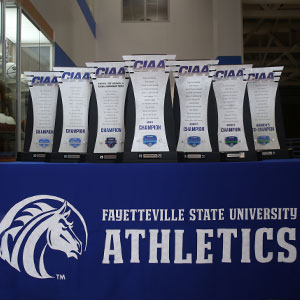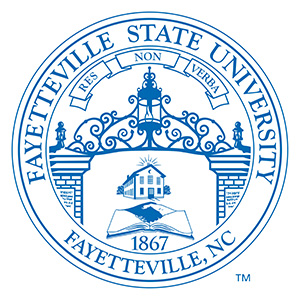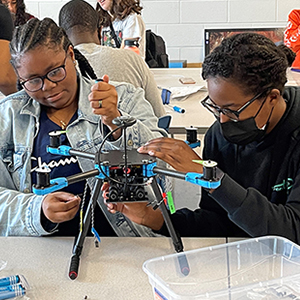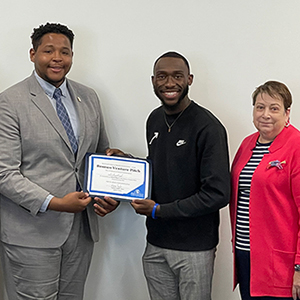Become a McNair Scholar
The McNair Scholars Program is a federally funded TRiO program at over 150 institutions across the United States and Puerto Rico by the U.S. Department of Education. We accept students from underrepresented segments of society and prepare them for graduate school entry.
Want to Learn More? Contact Us:
Program Director
Dr. Charlesene McNeill-Blue Lyon Science Annex Rm: 224 1200 Murchison Rd. Fayetteville, NC 28301 (910) 672-2282
Program Coordinator
Queonnah Coleman Lyon Science Annex Rm: 224 1200 Murchison Rd. Fayetteville, NC 28301 (910) 672-2043
Program Assistant
Esslita Williams Lyon Science Annex Rm: 224 1200 Murchison Rd. Fayetteville, NC 28301 (910) 672-2162
6,726
Students
By the numbers: Our campus is home to many students, representing a diverse range of backgrounds and interests, all pursuing their academic and personal goals with passion and purpose.
80%
Minority
Our campus celebrates inclusivity and is proud to have a vibrant community of minority students, who bring unique perspectives and enrich our campus culture with their diverse experiences and contributions.
70%
Female Students
Our campus is proud to have a student body that is 70% female, reflecting our commitment to promoting gender equality and empowering women to pursue their academic and career aspirations with confidence and success.
17:1
Students to Faculty
Our campus provides a personalized learning experience that fosters strong relationships between students and faculty, promotes academic excellence, and prepares students for success in their chosen fields.
Ronald E. McNair Postbaccalaureate Achievement Program
We provide McNair Scholars with the opportunity to work one-on-one with a faculty mentor to conduct a research project. McNair Scholars are in residence at FSU during the summer and a FSU faculty mentor is identified with whom the student will work closely in the execution of the research. In addition, McNair Scholars are provided with GRE and graduate school preparation workshops along with other professional development seminars and scholarly activities. If you would like to receive more information regarding our program or if you are a faculty member at Fayetteville State University and you are interested in mentoring a student, please contact our office
Prospective McNair Scholars must meet ONE of the following criteria: a first-generation undergraduate student with financial need OR an underrepresented (minority) undergraduate student in a doctoral program.
Be committed to earning a PhD. within any discipline. The McNair Scholars Program will accept students who want to pursue dual degrees such as MD/PhD., DDS/PhD., or PharmD/PhD. We do not support students seeking to obtain professional degrees such as JD, MD, DDS, or PharmD.
You must also:
- Be a United States citizen or permanent resident
- Be a second semester sophomore or junior (at least 60 credit hours)
- Have a good record of academic achievement (GPA of 3.0 or higher)
- Be a dedicated, hard worker who will perform at his/her best
See below for the following when submitting your application packet. We only accept hard copies during our recruitment period annually in the fall semester.
Completed Student Application
Please complete the student application form in its entirety.
Personal Statement
Write a statement describing your educational and career goals from completion of your undergraduate degree through completion of your graduate/doctorate-level degree. Explain what you have done to prepare yourself to meet these goals (courses, work experience, extracurricular activities, etc.) In what ways would you like the McNair Program to help strengthen your preparedness for graduate school? What motivates you to pursue graduate studies? Additionally, outline one or more research interests upon which you would like to focus during the internship period.
Your statement should include research components such as:
- Why would like to pursue a research project in this (or these) particular topic area(s)?
- What experience do you have with research?
- How would your research in these areas fit into your academic or career aims?
Personal Statement should be 2 pages maximum.
Recommendation Forms/Letters of Recommendation
Two sealed and completed recommendation forms are required in your application packet. One of the recommendations should be from a faculty member in your discipline. Recommendation letters are also welcome as well they just would need to be attached to the form and sealed in their own individual envelope and signed across the flap. Recommendation forms may be sent directly from the recommender to our office if more convenient.
Official or Unofficial College/University Transcripts
Include an official or unofficial college transcript in your application packet.
Most Recent Federal Income Tax Return
If your parent(s) or guardian can claim you as a dependent on his/her tax return, you must submit a copy of that person's most recent federal income tax return. If your college/university considers you independent please note the following categories and submit a copy of the appropriate documentation
- Single
- Married filing jointly
- Married filing separately (please include a copy of spouse’s most recent federal income tax return)
- Head of household (with qualifying person)
- Qualifying widow(er) with dependent child
- If you are unsure of which forms you need to send, please contact our office. Please do not send us copies of your W2 forms.
- Make sure your tax forms are signed and dated by the appropriate person.
Taxable Income Verification Form
Please fill out the most recent Taxable Income Verification form for needed tax information.
Most Recent Student Aid Report (SAR)
Submit a copy of your most recent Student Aid Report (SAR). Include this with your application packet in addition to tax information. If you do not have a current SAR, but filed the FAFSA, please print and sign a copy from your online access through the FASFA website. Again, please sign and date the SAR.
Ronald Ervin McNair was born October 21, 1950, in Lake City, South Carolina. Dr. McNair received a bachelor's degree in physics from North Carolina A&T State University in 1971. In 1976, he received his Ph.D. in physics from the Massachusetts Institute of Technology (MIT), becoming nationally recognized for his work in the field of laser physics.
Dr. Ronald McNair lived an accomplished life as a research scientist, family man, pioneering astronaut, karate expert, jazz musician and a man of faith. In 1984, he became the second African American to fly in space aboard the STS-41-B Challenger mission. Sadly, on January 28, 1986, the Space Shuttle Challenger exploded after launch from the Kennedy Space Center; he was one of the seven-person crew who died.
After his death, Dr. McNair was awarded the Congressional Space Medal of Honor, and members of Congress provided funding for the Ronald E. McNair Post-Baccalaureate Achievement Program. Dr. Ronald E. McNair story serves as a model for people from all walks of life. His story is one that must be passed on from generation to generation.
How am I compensated?
In the McNair Scholars Program, you are paid for completing your research project and participating in the program. Scholars receive compensation through stipends.
Is the research stipend a scholarship?
No, because no service is required from you if give a scholarship. McNair Scholars put in hours on their research projects.
Will the payment affect my financial aid?
No, the payment is awarded through stipends.
Do I have to attend graduate school at FSU?
No, McNair Scholars receive fee waivers for more than 200 graduate schools across the nation, and can be accepted all over the nation.
What if I want to get a JD, MD, DDS, or PharmD?
The McNair Program does not support these degrees. We only support students who want to earn PhDs. We however, will accept students who want to pursue dual degrees such as MD/PhD, DDS/PhD, or PharmD/PhD.
Does it matter what my major is?
No, McNair Scholars may come from any discipline.
Will participating in the McNair Program cost me anything?
No, it will only cost you your dedication and time.
What are some of the things McNair Scholars get for FREE?
GRE fee reduction waivers and graduate school applications fee waivers. Scholars are eligible for McNair fellowships at universities all over the nation. Computers and other resources are available to scholars to use. We also offer you free workshops, classes and social events with other McNair scholars across the nation. We are here to help you succeed academically.
What does it mean to be an underrepresented group?
Underrepresented ethnic and racial groups are Black (non-Hispanic), Hispanic, and American Indian/Alaskan Native. The latter is to be documented as an enrolled member of a U.S. federally recognized American Indian tribe or Alaska Native Group, or possesses one fourth degree (federally recognized) Indian blood prior to selection.
Are part-time students eligible to become McNair Scholars?
The requirements state that you have to be enrolled at FSU and hold a full-time status (12 units or more).
What if work, family, or other commitments conflict with the summer research internship?
There must be a balance between your commitments outside academics and your commitment to furthering your education. you will have to manage your time and energy in graduate school, so we expect you to do the same in the McNair Program summer research internship.
May I choose my own mentor?
Yes, but we do ask that your primary mentor be a FSU faculty member with a doctoral degree.
What should you do before your interview with the McNair Scholars office?
Review the McNair Scholars website (if you are on this page, you have begun this step!)
Be committed to obtaining your Ph.D. (in any area of study)
Research the field you may want to pursue as a graduate student (i.e. Biology, Sociology, Mathematics, Graduate School)
Research what program will be most compatible with your interests and abilities.
Know if you are available to fulfill the summer requirements of the McNair Program (vigorous research, GRE preparation, poster presentations, etc.)
Research FSU faculty you may want as a research mentor (a former professor, etc)
Understand the McNair Program only supports students who want to earn a Ph.D.





